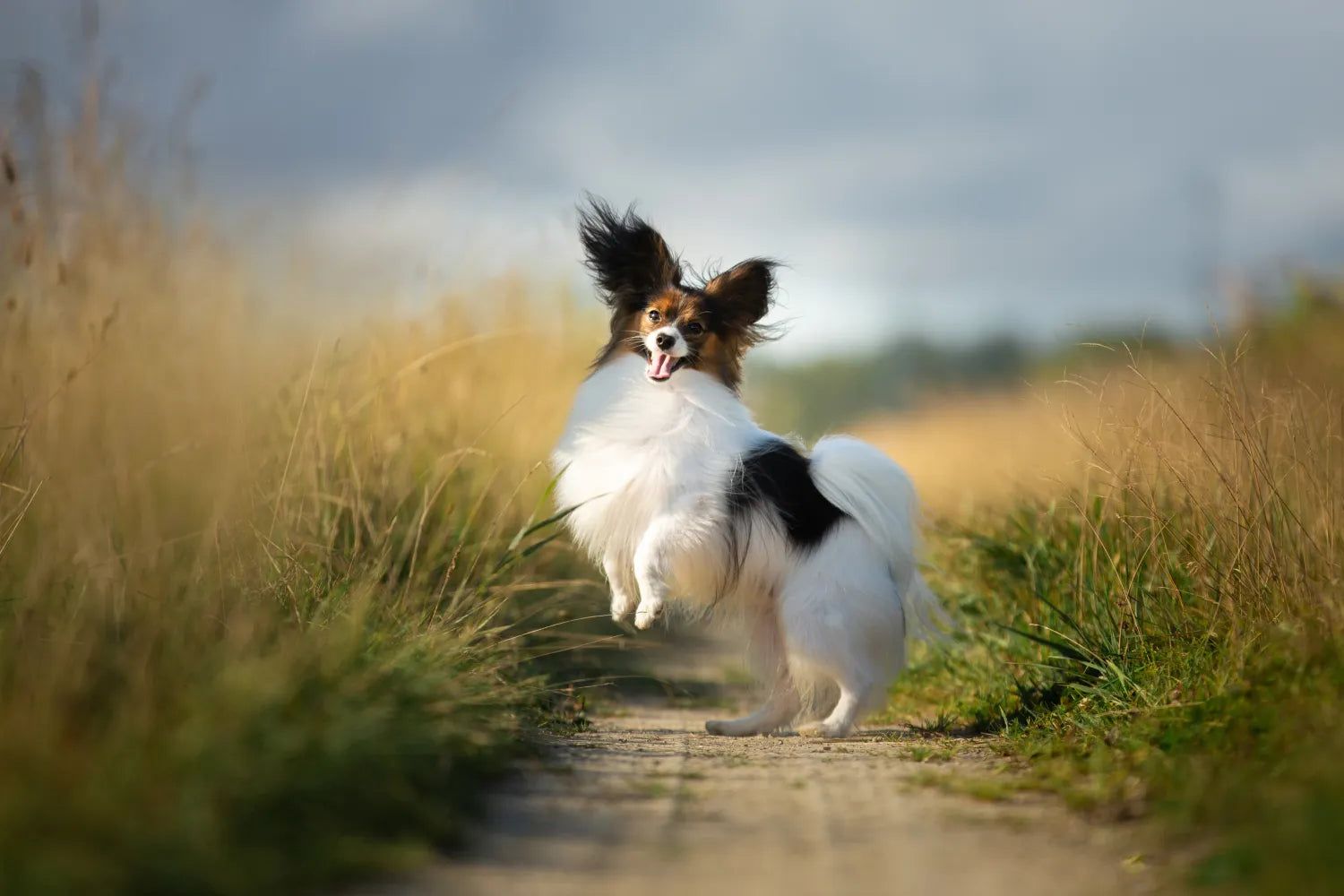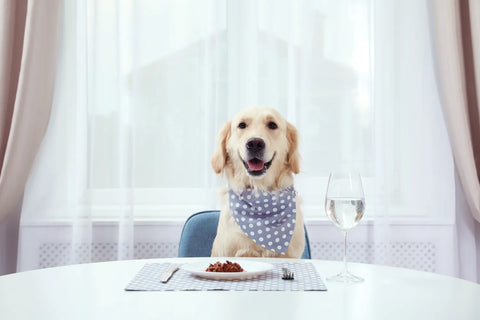
Caring for Your Papillon Dog: Easy Care Guide
Imagine a dog that combines the elegance of a royal portrait with the spirit of an endless playdate. That's the Papillon for you — a breed that's as rich in history as it is in personality.
Here at A Pup Above, where we pour our hearts into crafting meals fit for all dogs, we're all about celebrating the unique charm of each breed. The Papillon, with its butterfly-like ears and vivacious character, holds a special place in the breadth of dog breeds.
Join us as we learn more about the Papillon, uncovering the secrets to their care, their royal past, and the traits that make them a beloved companion across the globe.
WHERE IS THE PAPILLON FROM?
The story of the Papillon is one draped in the opulence of European courts, tracing back to the 16th century. Initially bred as a lapdog for noblewomen, this breed has graced the laps of French queens and danced through the grand halls of Spain.
Known historically as the Dwarf Spaniel and later the Continental Toy Spaniel, the Papillon was a favorite subject of artists like Titian, who immortalized their elegant form in his paintings. It was France, however, that gave this breed its name, “Papillon,” meaning “butterfly” in French, inspired by the unique, fringed ears that resemble the wings of a butterfly.
UNDERSTANDING THE PAPILLON'S UNIQUE TRAITS
The Papillon boasts characteristics that make it stand out in the world of small dogs. Here's a closer look at what makes these little dynamos so special:
ENERGETIC AND HIGH-SPIRITED
Despite their dainty appearance, Papillons have a high energy level. They thrive on activity and enjoy engaging in play and exercise, embodying the essence of a high-energy dog in a compact package.
SILKY, FLOWING COAT
One of the breed's most eye-catching features is its beautiful silky coat. The coat requires surprisingly minimal grooming, making the Papillon as practical as it is elegant.
ICONIC BUTTERFLY EARS
The Papillon is named for its distinctive erect ears, which resemble the wings of a butterfly. This breed standard feature adds to their unique and recognizable profile. However, the Phalene variety, with its lovely drop ears, reminds us of the breed's versatility and charm.
TRAINABILITY AND INTELLIGENCE
Known for their keen intelligence, Papillons excel in dog training and learning new tricks. Their eagerness to please and capacity for mental stimulation make them delightful companions for those willing to engage their minds.
ADAPTABILITY
Papillons are remarkably adaptable, making excellent family dogs and companion dogs. They can thrive in various living situations, from apartments to homes with large yards, proving that great things come in small packages.
AFFECTIONATE NATURE
Beyond their physical traits, Papillons are known for their loving and affectionate demeanor. They form strong bonds with their owners, often described as cuddle enthusiasts who cherish time spent in the laps of their human companions.
HOW DO I CARE FOR MY PAPILLON?
Caring for a Papillon dog goes beyond love and affection. It’s about understanding and meeting their unique needs to ensure they lead a vibrant and healthy life.
Let's dive into how to provide the best care for your Papillon.
CREATE A COMFORTABLE ENVIRONMENT
A Papillon's environment plays a crucial role in their well-being. These little dogs thrive in a home that caters to their physical and emotional needs.
- Warm Spaces: Papillons, with their small size and thin coats, are sensitive to cold weather. Ensure they have a cozy retreat with warm bedding or a doggy sweater for cooler days to keep them comfortable.
- Safe Play Areas: Their high energy and curiosity necessitate a safe, secure area where they can explore and play without risk. Whether indoors or in a fenced yard, the space should be free of hazards that could harm such a small breed.
- Quiet Corner for Rest: Despite their lively nature, Papillons also need downtime. A quiet corner with a soft bed allows them to retreat and recharge after a day full of activities.
PREVENT COMMON HEALTH ISSUES WITH ROUTINE HEALTH CHECKS
Regular health checks are indispensable in preventing and managing health conditions that Papillons may face. Early detection can significantly impact their health and lifespan.
Patellar Luxation is common in small dogs, including Papillons. Regular vet visits can help monitor for signs of this and other joint issues, ensuring your pup stays as mobile and pain-free as possible.
Progressive Retinal Atrophy and other eye conditions can affect Papillons. Annual eye exams can catch early signs, protecting your dog from potential vision loss.
Due to their small size, Papillons are also prone to dental issues. Regular dental check-ups and cleanings are crucial to prevent problems that could affect their overall health.
ENGAGE THEIR MINDS AND BODIES
A Papillon's lively intellect and high energy level mean they thrive on engagement that challenges both mind and body.
- Daily Exercise: Incorporate activities that cater to their exercise needs and match their energy level. Short walks, interactive play, and even agility courses can keep them physically healthy and mentally sharp.
- Mental Stimulation: Puzzle toys, learning new tricks, and dog training sessions can provide the mental stimulation Papillons crave. These activities not only keep boredom at bay but also strengthen your bond.
- Interactive Play: Use toys that encourage your Papillon to think and move, such as hide-and-seek games or fetch with a twist. These activities cater to their high energy levels and need for mental engagement, ensuring they remain both physically fit and mentally stimulated.
GROOM FOR HEALTH AND COMFORT
Grooming is more than just about keeping your Papillon looking their best — it's also about maintaining their health.
- Regular Brushing: Their silky coat requires regular grooming to prevent mats and tangles. Brushing several times a week can keep their fur in top condition and provide the opportunity to check for any skin issues or parasites.
- Ear Care: Those iconic butterfly ears need regular checks and cleaning to prevent infections. Keeping the ears dry and clean contributes to overall ear health.
- Nail Trimming: Long nails can lead to discomfort and mobility issues for Papillons. Routine nail trims help prevent this, ensuring your Papillon can move freely and comfortably.
SOCIALIZE AND TRAIN
Socialization and training are crucial for ensuring your Papillon grows into a well-adjusted and obedient companion.
Introduce your Papillon to a variety of people, pets, and environments early on. Positive experiences during their puppy years can help them become confident and friendly adults.
Take advantage of the Papillon's intelligence and eagerness to please by engaging in consistent, positive reinforcement training. They excel in obedience and agility, making training both a fun and enriching experience.
Tailor your training techniques to match your Papillon's learning style. Their high intelligence and sensitivity mean they respond well to gentle, patient guidance.
TAILOR NUTRITION TO THEIR NEEDS
Proper nutrition is fundamental to your Papillon's health, supporting everything from their silky coat to their boundless energy.
- High-Quality Diet: Choose a high-quality, human-grade dog food that meets the nutritional demands of this energetic breed. At a Pup Above, we offer delicious options like the Turkey Pawella and Texas Beef Stew, perfectly portioned for little dogs with big appetites, ensuring your Papillon gets the nutrients they need in every bite.
- Regular Feeding Schedule: Consistency is key. Feeding your Papillon at the same time daily helps regulate their metabolism and energy levels, which is crucial for a breed with such high vitality.
- Hydration: Always have fresh water available to keep your Papillon well-hydrated, supporting their overall health and aiding in digestion.
Papillon Feeding Chart
Now that you understand the nutritional needs of a Papillon, how exactly should you translate that into daily meals for every stage of their life? Here’s a comprehensive feeding chart that'll help keep your Papillon healthy, whether they're a spry puppy or a distinguished senior.
Feeding Guide by Life Stage
- Puppies (under 1 year): It's important for Papillon puppies, with their swift growth and high energy levels, to get a diet that supports their development. Opt for a high-quality puppy food rich in nutrients like calcium for strong bones and omega-3 fatty acids for brain development. Wondering about treats? Adding blueberries, as recommended in our "What Fruits are Good for Dogs?" article, can be a healthy, hydrating snack.
Amount of Food: Generally, a lively Papillon puppy should eat about ¼ to ⅓ cup of food per meal, served three to four times a day, depending on their specific energy levels and body condition.
- Adult Papillons (1-8 years): As they mature, switch to adult dog food formulated to maintain their vibrancy without leading to obesity. Foods rich in fatty acids and free from unnecessary fillers are ideal.
How Much To Feed: An adult Papillon typically thrives on about ½ cup of dry dog food per day, ideally divided into two meals. Adjust this based on their activity level and any dietary recommendations from your vet related to health problems or weight gain concerns.
- Seniors (over 8 years): Older Papillons need diet adjustments to account for their slowing metabolism. Look for food that's lower in calories but still rich in nutrients to help manage body weight and support joint health. Supplements like glucosamine can be beneficial, as well as incorporating wet food to assist with hydration and ease of eating.
Feeding Amounts: Reduce their food slightly to prevent overfeeding as their activity diminishes. Consider incorporating easy-to-digest options like well-cooked brown rice or special senior dog kibble that accommodates their aging digestive system and teeth.
CONCLUSION: FOSTER A LIFETIME OF LOVE
At A Pup Above, we believe that caring for your Papillon with love, understanding, and patience turns every day into an adventure filled with joy and companionship. By providing them with a comfortable environment, tailored nutrition like our human-grade meals, regular health checks, and engaging their lively minds and bodies, you're not just meeting their needs — you're enriching their lives and yours.
Let's embark on this journey together, fostering a lifetime of love and happiness for your beloved Papillon.
Sources:
About Papillons | THE PAPILLON CLUB OF AMERICA, INC.
Papillon Dog Breed Information | The AKC | The American Kennel Club (AKC)
Pet Hydration | Valley Animal Center
Luxating patella: A painful but treatable problem | Animal Health Foundation
Top Stories

Why Do Dogs Lick Their Paws?

Why Do Dogs Whimper & Make Noises in Their Sleep?

Healthy Vet-Approved Homemade Dog Food Recipes

How To Cook Sweet Potatoes for Dogs






















